Profit with Peanuts: Success story of Tinnie’s Food Products
By
DTI-Regional Operations Group
March 1, 2021
MAKATI CITY –
Peanut Butter with none of the guilt? Tinnie’s Food Products made it
possible.
 Tinnie’s
Food Products is a manufacturer of food spreads and other food
products, and is well known for its creamy and crunchy peanut
butter. Moreover, they are the premier peanut butter manufacturer in
the town of Odiongan, Romblon, since 1996.
Tinnie’s
Food Products is a manufacturer of food spreads and other food
products, and is well known for its creamy and crunchy peanut
butter. Moreover, they are the premier peanut butter manufacturer in
the town of Odiongan, Romblon, since 1996.
For peanut butter lovers
with a healthy appetite, Tinnie’s peanut butter is one of the best
options to satisfy sweet cravings with no regrets. Tinnie’s peanut
butter products are made from 100% pure peanuts, with no added sugar
and extender. Today, with the abundant supply of peanuts in the
province, Tinnie’s also sell sugar coated and fried peanuts
alongside its pickled papaya and guava jelly spread.
The enterprise is not new
to accomplishments, as Tinnie’s carries a couple of accolades under
its belt from national and regional trade exhibitions and fairs. In
the last run of the MIMAROPA Naturally Agri-Trade and Tourism Fair
in 2019, Tinnie’s Food Products was awarded the Most Improved
Enterprise, and notably, the participant with the highest acquired
sales during the fair. St. Vincent Ferrer Parish Multi-Purpose
Cooperative in Romblon has also awarded Tinnie's as their Top
Patronizer.
As peanut butter is
considered a pantry essential in a Filipino family’s morning and
merienda routine, Tinnie’s aims to bring a healthier version of the
spread to as many homes as possible. They do this by attending
various seminars on food safety and management, and business
development, such as SSOP and cGMP, Customized Workshop on Basic GMP
and HACCP Principle, Kapatid Mentor Me Negosyo Seminar, Strategic
Entrepreneurship, Empowering the MSME’s through Basic Education,
Philippine Export Competitiveness Program, and FDA Academy, among
others. Ms.Mary Jane Manalo, owner of Tinnie’s Food Products, was
also part of the Kapatid Mentor ME Program in 2017 and the SGS
Negosyo Kaagapay. Complementing these assistances, the products
likewise underwent the Regional Integrated Product Development
Assistance (RIPDA) under the One Town, One Product (OTOP) Program of
DTI.
Significantly, they were
able to construct a small building for their production area and
purchase additional machineries and lot for future business
expansion. With the help of DTI, the enterprise was able to acquire
three full-time employees, and one part-time employee to help in
their growing production. Their monthly gross sales also tripled
since then.
After two years of
development and promotion, Tinnie’s Peanut Butter became one of the
best-selling peanut butters in the province. It finally found a
niche not only in Romblon but also to other places such as Mindoro,
Metro Manila, and Bohol.
Just as any other
business, Tinnie’s felt the impact of the COVID-19 pandemic on
operations and demand in the market. Despite this, the enterprise
sees this as an opportunity to innovate and expand their product
lines to support the business and their workers.
Tinnie's Food Products are
available online, via Facebook, Shopee, and other digital platforms.
For more information, visit their social media pages, or send an
email at tinniesfp@yahoo.com.
|
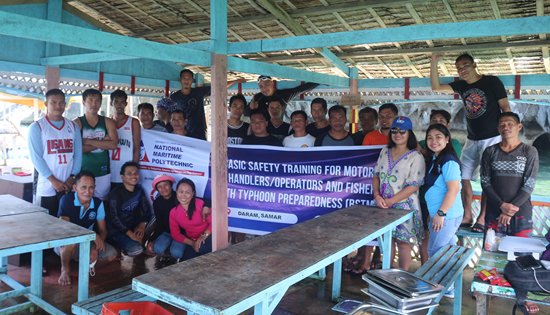
Motorboat
handlers / operators and fisherfolks participate in the
Basic Safety Training for MHOF conducted by NMP in
cooperation with PCG, MARINA and the LGU of Daram, Samar. |
NMP partners with
LGU Daram for FREE Training on Basic Safety
By
National Maritime
Polytechnic
February 26, 2021
TACLOBAN CITY – The
National Maritime Polytechnic (NMP), as part of its poverty-free
zone program thrust, conducted for FREE, the Basic Safety Training
for Motorboat Handlers/ Operators and Fishermen with Typhoon
Preparedness (BSTMHOF) to twenty (20) motorboat handlers / operators
/ fisherfolk’s participants of Daram, Samar on 23-24 February 2021
through blended learning.
The training was conducted taking cognizant of the fact that Daram
being one the island municipalities in the Province of Samar is
vulnerable to typhoons and other extreme weather disturbances.
Likewise, being an island, the main source of income of its people
is through fishing while the mode of transportation is by boat.
Consequently, Provincial Mayor of Daram, Hon. Mayor Philip Martin L.
Astorga, requested from NMP through a letter dated 25 January 2021
to conduct the said training to equip his residents with additional
knowledge and confidence on survival skills and how to respond
properly in the event of emergencies.
“Alam po namin na magagaling na kayo sa inyong larangan pero
kailangan nating ilagay sa tamang perspektibo yung ating mga
natutunan. Ang layunin ng training na ito ay madagdagan ng tulong at
kaalaman ang inyong mga kakayahan na pang habang-buhay ninyong
maisasama at kailanman ay hindi maaaring manakaw mula sa inyo” said
NMP Executive Director Joel B. Maglunsod in his Welcome Message.
The Basic Safety Training for MHOF is aimed at improving the basic
safety skills of local motorboat operators and fisherfolks and
expose them to new techniques in Personal Survival, Fire Prevention
and Firefighting, Elementary First Aid and Personal Safety and
Social Responsibility. Other salient topics are Rules of the Road,
Typhoon Awareness and Marine Safety Requirements.
Moreover, in order to promote gender equality and address the gender
issues present in the field of the marginalized industry, the Gender
Sensitivity Training (GST) Course was also incorporated in the
discussions.
The first day of the training was conducted through online using
zoom videoconferencing platform. On 24 February 2021, NMP Team
headed by Deputy Executive Director III, Ms. Mayla N. Macadawan
proceeded to Daram, Samar for the conduct of practical exercises and
assessment.
This was the first batch of graduates produced by NMP on BSTMHOF
this year. Coordination with other LGUs in Region 8 is currently
being made for possible collaboration, thereby expanding the reach
of beneficiaries for this program.
Likewise, NMP is in consultation with the Department of Labor and
Employment (DOLE) Central Office for the possible grant of motorized
bancas to various fisherfolks association in the region through the
DOLE’s livelihood assistance. Said bancas can also be used during
rescue operations in times of disasters and calamities.
Meanwhile, NMP continues to conduct face-to-face trainings
exclusively to the seafarer-trainees residing within Region VIII,
imposing strict implementation of the Maritime Industry Authority’s
(MARINA) approved Post-Enhanced Community Quarantine Operational
Plan and other health and safety protocols as required by the
Department of Health (DOH), Department of Labor and Employment
(DOLE), and local government unit (LGU).
Likewise, seafarers who are interested to avail of the NMP’s FREE
online classes on SHAPIMS, PADAMS, and GSTS may register through
this link: https://nmp.gov.ph/online-course-offerings/.
Stakeholders who wish to validate the authenticity of their
seafarers-employed with NMP issued certificates may visit
www.verify.nmp.gov.ph. Also, those interested in NMP research
undertakings may visit the NMP website and access the e-Research
Information System Portal which is designed to disseminate NMP
completed researches, present the Research Agenda, and engage the
industry stakeholders to collaborate in the research activities.
Further, NMP encourages OWWA registered seafarers to avail of the
NMP-OWWA (Overseas Workers Welfare Administration) Seafarers’
Upgrading Program (SUP) and Skills for Employment Scholarship
Program (SESP) which entitles the beneficiary to receive financial
assistance for training costs from the OWWA.
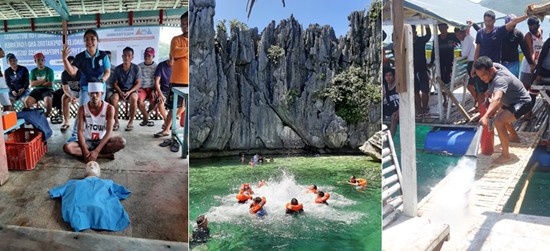
NMP
Trainers conducting practical assessment on BSTMHOF at Kandiwata,
Daram, Samar. |
Global ad market
is set to hit $769.9 billion by 2024
Via OMNES Media
February 26, 2021
This is the right time for media vendors to grab
their share as the race between companies to increase their ad
expenses intensifies, says Chief Executive Officer of Advert on
Click
DUBAI – Amid an
intensifying race between companies to increase their advertising
expenditure to boost profitability prospects, the global advertising
market is set to reach $769.9 billion by 2024, an industry expert
has pointed out.
 “Advertising
plays a vital role in communicating the value proposition of an
organisation’s offering and influencing the buying behaviour of
consumers. This is the reason why most companies around the world
focus more on advertisements of their products and services,” said
Fahed Aldeeb, Chief Executive Officer of Advert on Click (advertonclick.com).
“Advertising
plays a vital role in communicating the value proposition of an
organisation’s offering and influencing the buying behaviour of
consumers. This is the reason why most companies around the world
focus more on advertisements of their products and services,” said
Fahed Aldeeb, Chief Executive Officer of Advert on Click (advertonclick.com).
Digital advertisement
portal Advert on Click is a one-of-its-kind digital platforms that
connects all stakeholders of the media industry from across the
world.
“As much as digital media
has grown, it is working with traditional media to continue the 360
degree media mix that marketers strive for. So, digital media has
not replaced traditional media, but adds to it to complete the
circle,” added the CEO of Advert on Click, which offers a new-age
platform to showcase and promote advertising spaces and solutions of
broadcast, print, online and OOH (out-of-home) players from all
around the globe.
“The Covid-19 pandemic has
accelerated clients’ digital transformation journey. Bearing this in
mind, Offline media such as TV, Radio and OOH also benefitted in
some markets due to lockdowns. This is the right time to board the
bandwagon and stay ahead of your competitors. By registering at
Advert on Click, you can have the whole marketplace at your
fingertips through outreach and unique services that help you get
accurate information, display, transparent comparisons, media plan
preparation and media booking ability,” he said.
More than 950 vendors have
already registered with Advert on Click, the platform is poised to
launch to advertisers in the coming weeks. The platform boasts, ad
space from all types of media vendors, be it digital, print,
broadcast or OOH.
“Advert on Click allows
listing or booking of media space with just a few clicks. Our unique
algorithms connect the right media buyer with the media seller for
optimal results in advertising,” said Aldeeb.
The information offered by
Advert on Click – an integrated knowledge base that empowers direct
advertisers and media buying agencies – includes space availability,
technical specifications, information about the media outlets as
well as their rate cards.
|
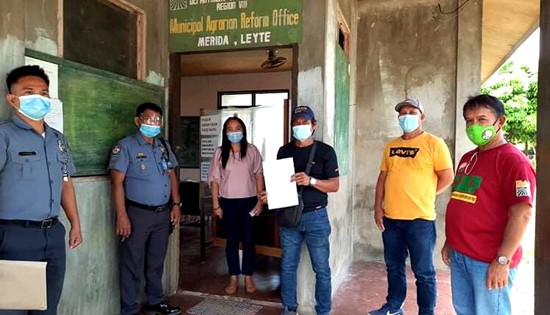
The
Municipal Agrarian Reform Office in Merida, Leyte, under
Municipal Agrarian Reform Program Officer Amita Barte,
successfully linked the Mat-e Agrarian Reform
Beneficiaries Association (MARBA) to the Bureau of Jail
Management and Penology (BJMP) in Isabel, Leyte as
institutional buyer for the farmer’s harvests.
(Photo by MARO Amita Barte) |
BJMP signs
marketing agreement with Merida farmers
Press Release
February 26, 2021
MERIDA, Leyte –
Another agrarian reform beneficiaries’ organization (ARBO) from the
western part of the province of Leyte recently entered into a
marketing agreement with an institutional buyer for their harvests.
OIC-Regional Director
Ismael P. Aya-ay disclosed that the Mat-e Agrarian Reform
Beneficiaries Association (MARBA), based in this fifth-class
municipality, became the 15th ARBO in Eastern Visayas to be linked
successfully to an institutional buyer by the Department of Agrarian
Reform (DAR) under the Enhanced Partnership Against Hunger and
Poverty (EPAHP) program.
Municipal Agrarian Reform
Program Officer (MARPO) Amita Barte reported that the signing of the
marketing agreement took place on February 3 at her office and in
front of MARBA president, Carllito Dela Cruz and Bureau of Jail
Management and Penology (BJMP) District Jail Warden, SJO4 Basilio
Madula Jr.
Also present in the event
were MARPO staff Mateo Maratas and BJMP Jail Officer 2 Allan Perez.
Barte explained that in their agreement, the BJMP of Isabel town
will purchase food supplies from the DAR-assisted farmer
organization, such as vegetables and poultry products, to be used in
feeding persons deprived of liberty (PDL). BJMP will buy MARBA’s
products based on the prevailing market price, and will pick them up
in a designated area, she added.
Under the EPAHP, according
to Aya-ay, instead of buying food supplies elsewhere, the
city/district/municipality jails as well as the Department of
Health’s-retained hospitals are encouraged to procure food supplies
for the feeding of PDLs and in-patients, respectively, from the
ARBOs, which is allowed by the Government Procurement Policy Board
thru Resolution No. 17-2016. He also emphasized that under the
program, farmers are guaranteed a ready market for their products
while hospitals and jails are assured of freshly harvested fruits
and vegetables.
EV welcomes 2021
with 2.2% inflation rate
By
PSA-8
February 24, 2021
TACLOBAN CITY –
Eastern Visayas welcomed January 2021 with a 2.2 percent Inflation
Rate (IR). This IR is 0.2 percentage point lower compared with the
2.4 percent IR in December 2020. This figure, however, is 0.2
percentage point higher than the recorded 2.0 percent IR in the same
period last year.
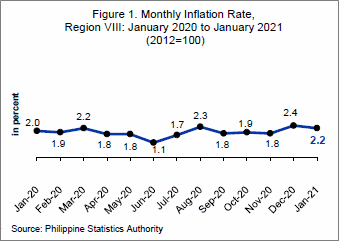 The regional IR is 2.0
percentage points lower than the 4.2 percent national average
inflation rate in January 2021.
The regional IR is 2.0
percentage points lower than the 4.2 percent national average
inflation rate in January 2021.
Among the provinces, only
Samar registered an increase in IR of 0.3 percentage point. It rose
to 5.8 percent in January 2021 from 5.5 percent in December 2020.
This is the highest IR among the provinces during the reference
month. Leyte, meanwhile, retained its previous month’s IR at 1.9
percent.
Biliran registered the
highest decrease of 0.8 percentage point, pushing its IR to zero in
January 2021. Northern Samar, Southern Leyte, and Eastern Samar’s
IRs registered decreases ranging from 0.1 percentage point to 0.7
percentage point, settling at 3.3 percent, 3.0 percent, and 1.4
percent, respectively, during the month in review.
Five (5) of the 11
commodity groups in the region exhibited lower IRs in January 2021
compared with their rates in December 2020. Alcoholic beverages and
tobacco commodity group registered the biggest decrease of 1.9
percentage points, from 9.3 percent in December 2020 to 7.4 percent
in January 2021. This decrease may be traced to slower IR in the
index for tobacco, from double digit 12.4 percent in December 2020
to 9.1 percent in January 2021.
Prices for housing, water,
electricity, gas and other fuels commodity group further deflated to
1.4 percent in January 2021 from 0.6 percent in December 2020, a
continued drop by 0.8 percentage point. This can be attributed to
the index for electricity, gas and other fuels which posted
deflation of 4.9 percent in January 2021 from 2.8 percent deflation
in December 2020.
Compared with their
December 2020 levels, the IRs for clothing and footwear commodity
group (2.5%) and health commodity group (1.1%) were lower by 0.2
percentage point and 0.1 percentage point, respectively, in January
2021.
The IR for food and
non-alcoholic beverages commodity group eased by 0.1 percentage
point, from 3.1 percent in December 2020 to 3.0 percent in January
2021. Double digit IRs were noted in vegetables and fruits indices
at 15.9 percent and 12.0 percent, respectively. Prices of meat
picked up by 3.1 percent in January 2021 from 1.4 percent in
December 2020. Increased IRs were also registered in the indices for
food products not elsewhere classified (6.9 percent); sugar, jam,
honey, chocolate, and confectionary products (1.9 percent); and rice
(0.6 percent). However, the 2.9 percent deflation in corn index, and
the drop in the IR for fish index to 0.3 percent in January 2021
from 2.9 percent in December 2020, eased the impact of those
increases to the overall IR of the commodity group.
On the other hand, IR for
transport commodity group increased by 0.6 percentage point. The 5.0
percent IR in December 2020 rose to 5.6 percent in January 2021. The
3.0 percent deflation registered in the index for operation of
personal transport equipment was offset by the higher IR (9.6%)
posted in the index for transport services.
Restaurant and
miscellaneous goods and services commodity group recorded 0.4
percentage points increase in its IR, from 3.8 percent in December
2020 to 4.2 percent in January 2021. This can be traced to higher
IRs in the indices for catering services (6.3%) and personal care
(2.6%).
Communications commodity
group and recreation and culture commodity group continued to post
deflations but at a slower rate, settling at 1.5 percent and 1.3
percent during the month in review.
Meanwhile, the commodity
groups of furnishings, household equipment and routine maintenance
of the house and education retained their previous month’s IRs at
2.4 percent and 0.4 percent, respectively.
The Purchasing Power of
Peso (PPP) of the region weakened to P0.77 in January 2021. This PPP
implies that the goods and services worth P77.00 in 2012 is worth
P100.00 in January 2021.
Compared to their levels
in December 2020, PPP in Biliran, Leyte and Samar weakened by P0.01
in January 2021. The rest of the provinces retained their previous
month’s PPP. Biliran recorded the strongest PPP among provinces in
January 2021 at P0.81. Leyte and Southern Leyte ranked second both
at P0.79, followed by Eastern Samar at P0.75 and Northern Samar at
P0.72. Samar posted the weakest PPP during the reference month at
P0.70.
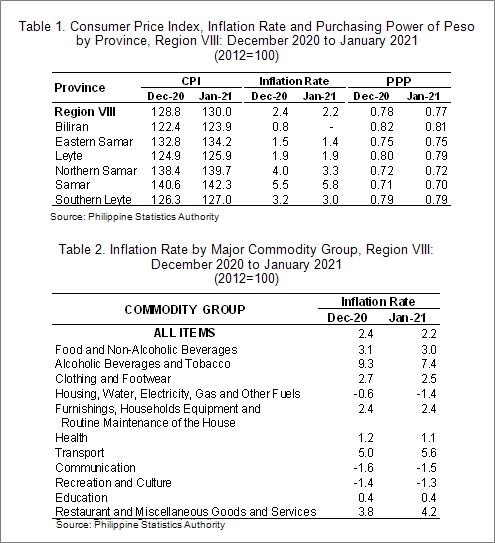
DTI-BPS now
requires product certification for plywood

By
DTI-CPG-Bureau of Philippine Standards
February 18, 2021
MAKATI CITY – The
Department of Trade and Industry’s Bureau of Philippine Standards
(DTI-BPS) has recently included plywood under the list of products
required to undergo its Product Certification Schemes through the
issuance of DTI Department Administrative Order (DAO) No. 20-06,
series of 2020 on 15 October 2020.
With the issuance of DAO
No. 20-06, the new technical regulation concerning the mandatory
product certification of locally manufactured or imported plywood,
manufacturers of plywood are now required to secure the Philippine
Standard (PS) Quality Certification Mark License before they can
sell or distribute their products to the market. Importers, on the
other hand, are now required to acquire their products from foreign
manufacturers holding valid PS Licenses only. This technical
regulation aims to strictly ensure compliance to specified quality
requirements for plywood being sold in the Philippine market.
Plywood is one of the most
commonly used construction materials in the country. Many Filipino
homes have facades, exterior and interior walls made with plywood.
Equipment in construction and/or manufacturing industries also
utilize plywood as a means to support loads or products. Moreover,
marine ports, docks, vessels, and boats use plywood for sturdier
built since shipments of high masses are often transported through
sea freights for lower cost. Plywood has become the go-to component
in every construction activity due to their usage versatility,
durability, and lower cost. Their ready availability in the market
makes them essential to every Filipino household.
Pursuant also to DAO No.
20-06, s. 2020, imported or locally manufactured plywood products
shall now have the minimum required markings as follows:
• Correct and registered
trade name or brand name;
• Duly registered
trademark;
• Duly registered Business
Name and address of importer and manufacturer (if imported) or duly
registered Business Name and address of manufacturer (if locally
manufactured);
• Country of Origin;
• Type of plywood
(Softwood or Hardwood);
• Bonding Class (1, 2 or
3);
• Thickness, mm;
• Formaldehyde Emission
"FE" and the star rating (In reference to PNS 2103:2017,
Formaldehyde Emissions - Specifications or its future amendments);
• Lot/Batch Number or
Serial Number;
• PS Mark with License
Number
These markings are not
only for traceability and verification purposes but will also serve
as guide for consumers in ensuring that the plywood products they
purchase comply with the quality and safety requirements of the
DTI-BPS.
“Through this technical
regulation, the DTI-BPS aims to promote safer working and living
environment for everyone”, underscores DTI-BPS Director, Neil P.
Catajay. “Knowing that we all have the same vision, we are confident
that the wood and construction industry will cooperate with the
implementation of this technical regulation to combat the
proliferation of substandard plywood in the Philippine Market.”
Director Catajay states.
DAO No. 20-06, series of
2020, and other issuances may be downloaded from the BPS Standards
and Conformance Portal, www.bps.dti.gov.ph (direct link:
https://bit.ly/BPSissuances).
For more updates and
information on standards, technical regulations, and conformity
assessment procedures (STRACAP), please visit the DTI-BPS portal:
www.bps.dti.gov.ph. Emails and messages may also be sent to our
official Facebook page “DTI Bureau of Philippine Standards” or
through bps@dti.gov.ph.
Upset Hindus seek
apology from Rihanna for donning Lord Ganesha pendant in topless
photo-shoot
Press Release
February 17, 2021
Upset Hindus are seeking
apology from singer-actress-businesswoman Rihanna for wearing Lord
Ganesha pendant (on a long necklace) covering her belly-button and
posted on her official Twitter handle on February 15, calling it
highly inappropriate.
 Hindu statesman Rajan Zed,
in a statement in Nevada (USA) today, said that Lord Ganesha was
highly revered in Hinduism and was meant to be worshipped in temples
or home shrines and not to be used as a fashion statement to push a
sexy lingerie line or become a tool for sexy fashion. Inappropriate
usage of sacred Hindu deities or concepts or symbols or icons for
commercial or other agenda was not okay as it hurt the devotees.
Hindu statesman Rajan Zed,
in a statement in Nevada (USA) today, said that Lord Ganesha was
highly revered in Hinduism and was meant to be worshipped in temples
or home shrines and not to be used as a fashion statement to push a
sexy lingerie line or become a tool for sexy fashion. Inappropriate
usage of sacred Hindu deities or concepts or symbols or icons for
commercial or other agenda was not okay as it hurt the devotees.
Zed, who is President of
Universal Society of Hinduism, emphasized that celebrities and
companies should not be in the business of religious appropriation,
sacrilege, and ridiculing entire communities. It was deeply
trivializing of immensely venerated Lord Ganesha to be displayed in
such a manner for mercantile greed.
Besides apologizing to the
worldwide Hindu community, Rajan Zed also urged Rihanna to
immediately remove the objectionable picture from her Twitter
account.
Hinduism was the oldest
and third largest religion of the world with about 1.2 billion
adherents and a rich philosophical thought and it should not be
taken frivolously. Symbols of any faith, larger or smaller, should
not be mishandled; Zed noted.
Many devotees did wear a
Lord Ganesha pendant on short necklace on a regular basis to express
their reverence/devotion in Lord Ganesha; but wearing it as a
fashion accessory in a one-time photo-shoot in this disrespectful
manner for commercial agenda was quite out of line; Rajan Zed
indicated.
Zed suggested Rihanna to
undergo training in religious and cultural sensitivity so that she
had a better understanding of the feelings of communities and
customers.
Rajan Zed further said
that such trivialization of Hindu deities was disturbing to the
Hindus world over. Hindus were for free artistic expression and
speech as much as anybody else if not more. But faith was something
sacred and attempts at trivializing it hurt the followers, Zed
added.
In Hinduism, Lord Ganesha
is worshipped as god of wisdom and remover of obstacles and is
invoked before the beginning of any major undertaking. There are
about three million Hindus in USA. February 15 happened to be
Ganesha Jayanti (Ganesha’s birthday).
Church group
decries relentless attacks against Bakwit Schools
Press Release
February 16, 2021
MANILA – The
National Council of Churches in the Philippines (NCCP) condemns the
violent intrusion of the elements of the PNP Regional Office in Cebu
into the University of San Carlos-Talamban Campus where the Lumad
Bakwit School is taking refuge. On February 15, 2021, the PNP barged
into the campus in an alleged “rescue operation” for minors
allegedly kidnapped by progressive groups.
“This intrusion of the PNP
is clear manifestation of this government’s disregard to the rights
and lives of our indigenous peoples, especially the Lumad children
who are already under constant and intense distress since they have
been uprooted from their ancestral lands on several occasions.” said
Bishop Reuel Marigza, the General Secretary of the NCCP.
“This is not the first.
They did the same to the Lumads who have sought a safe place in the
United Church of Christ in the Philippines (UCCP) Haran Center in
Davao. In their quest for a more peaceful place, away from their
military-occupied ancestral lands, the Lumads have no choice but to
flee and go to places where they feel that they are safe. It is just
abhorrent and unacceptable for us churches to see the government’s
relentless attacks to their lives and communities,” Bishop Marigza
added.
The setting up of Lumad
Bakwit Schools has been a collective response of the indigenous
peoples on the intensifying militarization and land grabbing of
Lumad communities in Mindanao. The Bakwit schools have been set up
by the elders of the communities, NGOs and churches to assert their
children’s right to education.
“NCCP firmly believes in
the inherent worth and dignity of children. They are God’s gift and
are valuable members of the human family. Thus, the NCCP upholds its
commitment to protect and defend children's rights,” Bishop Marigza
added.
“The violent raid in Cebu
showed us how the Government can conveniently assault our national
minorities even under the care of sanctuaries and havens in the
guise of ‘rescue operations’”, Bishop Marigza said. “This pseudo
‘rescue operations’ is clearly a violation of the rights of our
Lumad children and their teachers and to the whole Lumad communities
who have suffered decades-long struggles in defense of their
ancestral land, life and their education,” Bishop Marigza averred.
The NCCP is in solidarity
with the Lumad children in their struggle for their land and their
rights to education. “We join the call to end militarization in
Mindanao and to save Lumad schools. We likewise call for the safe
and immediate release of the 25 students including their elders and
their teachers who were illegally detained from this violent police
raid”, the Bishop concluded.
The NCCP is the largest
aggrupation of mainline Protestant and non-Roman Catholic churches
in the Philippines.